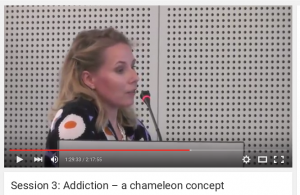In the spring of 2016, a discussion regarding research funding policies was raised by tenured professor Atte Oksanen, University of Tampere, and professor Pekka Räsänen, University of Turku. Oksanen and Räsänen have analysed the output from projects funded by the Academy of Finland’s Research Council for Culture and Society over a ten year period. Their analysis, which was published in the journal Tieteessä Tapahtuu, showed that the 391 million euros investments in a total of 1841 research projects have resulted in surprisingly little output in terms of publications. I wrote a piece about the discussions surrounding this study in the Curie journal, published by the the Swedish Vetenskapsrådet. (read it here)
The sociology of lifestyle governance
We eat, drink and game for a number of reasons: in order to fill up time, to manage stress, to dampen emotions, to punish ourselves – or just to create space for fun activities in our lives. This is our prerogative as prosperous people in consumer society. Our behaviour is supported by commercial promises, by a seemingly endless availability of products and consumption opportunities, by the attractions of defining and understanding ourselves through acts of consumption. At the same time, these very same societies are involved in a process of negotiating the limits for what are defined as excessive and problematic variants of these behaviours. This is the research focus of the University of Helsinki Centre for Research on Addiction, Control and Governance (CEACG) – a research group founded by professor Pekka Sulkunen.
Are the offline and the online two competing social worlds, which need to be balanced? How does great online engagement affect close offline relationships with family and friends?
A new study by Hellman, Karjalainen and Majamäki (2016), published in the journal New Media and Society inquires into how persons in a close relationship with a gamer of Massively multiplayer online role-playing games (MMORPG) perceive relationship problems caused by the gaming hobby. The study points to the timeliness in devoting attention to the premises under which intimacy and commitment are negotiated in offline and online relationship constellations.
A-Debate – U-Turn on Addictions

Barcelona and online, 17th-18th February 2016
ALICE RAP hosted an on-site and on-line final debate to present and discuss key research findings coming out of the project, their policy implications and the science with the greatest potential to contribute to smart and evidence-based global drugs policy.
The event participants were high-level scientists, policy actors from national and international organisations and expert civil society actors.
The online A-Debate was streamed live, and the session about the Area, which University of Helsinki has led, can be seen here: https://www.youtube.com/watch?v=PGLcPGJ3JEw
My presentation starts after the time mark 0’52.
Somessa otetaan poliittisesti kantaa
Pariisin marraskuisten terrori-iskujen jälkeen uhreja kunnioittavat Ranskan liput, kynttilät ja rauhansymbolit täyttivät sosiaalisten medioiden virrat. Jotkut huomauttivat, ettei Facebook tarjonnut Beirutissa samassa tilanteessa oleville ihmisille samanlaista ’Olen turvassa’ -välinettä tai muita libanonilaisille kohdistettuja sympatian ilmauksen muotoja. Vaikka en ole ihan vakuuttunut siitä, että somen luonteeseen kuuluisi olla tasaveroisten representaatioiden näyttämö, huomautus toimii silti terveellisenä muistutuksena siitä, miten uutiset eri puolilta maailmaa aktivoivat meitä poliittisesti somessa.
In the latest issue of the NAD journal (4/2015) I discuss how social sciences are becomming more and more compartmentalized and fragmentized, and researchers less mobile between fields. Instead, researchers are increasingly organized in thematic networks. All stages of knowledge production have, in its compartmentalized format, become so advanced and complicated that the career achievement of scholars risks becoming the one of a long row of small papers, articles, reports, thematic units stuck in a “repeat mode”.